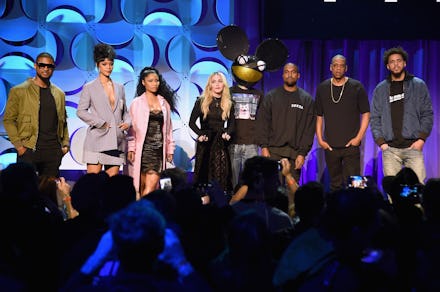Jay Z's New Streaming Service Is a Huge Step Backward for the Music Industry

On Monday evening, Alicia Keyes tried to start a revolution. "Jimi Hendrix once said that music doesn't lie," she said. "If there's something to be changed it has to happen through music."
As she spoke, Beyoncé, Calvin Harris, Chris Martin of Coldplay, Daft Punk, Jack White, Jason Aldean, J. Cole, Jay Z, Kanye West, Deadmaus, Madonna, Nicki Minaj, members of Arcade Fire, Rihanna and Usher looked on approvingly. All these stars had gathered for a surprise press conference to promote a new service called Tidal, recently acquired by Jay Z. The event was framed as a revolution in streaming music. Tech publications breathlessly awaited some big announcement that would change the streaming game. Perhaps it would be higher royalty rates for artists or at least a new standard for audio technology.
Instead, what we got was one clear message: Many already-wealthy pop stars would like to make more money on music. So they're stoking their vanity to make that a reality.
"The Tides, They Aren't A-Changing." The rollout began Monday morning with Jay Z tweeting the following message, co-opting lyrics (with a misplaced hyphen, for what it's worth) from Bob Dylan's landmark protest anthem to signal a very different type of revolution than any Dylan likely had in mind.
Jack White's Third Man Records, Kanye and Rihanna followed shortly thereafter, changing their backgrounds all teal.
This revolution was televised. "Our goal is simple. We want to create a better service and a better experience for both fans and artists," said Keyes at the rollout. She highlighted the service's offline mode and its curated playlists, two things that Spotify and other streaming services already feature. Even the design of the interface is essentially identical to Spotify's library.
The only feature announced at the press conference that's different is the access to "CD-quality lossless files," which will have much higher fidelity than Spotify's. To access these, listeners will have to pay $19.99 a month — essentially double Spotify's going rate for a subscription, which, if anything, makes it available to an even smaller group of listeners. Listeners can also select a plan at the going $9.99 rate for regular-quality audio, which brings us back where we started.
The way Tidal could really change things is to pay artists more. Yet nobody said anything definitive about artist royalties — the focus was on artists owning the service, aka artist equity. TechCrunch reported that Tidal's payouts may be nearly twice as large as its rivals, but this figure has yet to be confirmed. When the New York Times asked about artist royalties, Vania Schlogel, a Tidal executive, declined to comment with specifics.
It is possible that better royalties are on the horizon. Whatever deals the service is inking attracted Taylor Swift, who has written about how she despises Spotify for its fraction-of-a-penny payouts. Her most recent quadruple platinum album, 1989, is live on Tidal, making it the only service currently streaming it. This only proves that the system is designed to benefit the musical elite, with no mention of the artists that need it most — independents and rising musicians making our most cutting-edge music.
Spotify isn't the devil. Other streaming services aren't exactly as evil as Tidal has made them out to be. Spotify does currently pay between $0.006 to $0.0084 per stream in the United States. But according to the company's data, "global stars" like Calvin Harris and Nicki Minaj, can still earn pretty fat paychecks that range between $200,000 and $500,000 when all those streams tally up into the millions.
More importantly though, Spotify also believes in fair compensation for artists. It just isn't yet capable of generating those necessary sums because the subscriber base in America especially is too small. In places where the service is more established — such as Sweden, where a much larger percentage of the population pays for their subscriptions — artists make five to 10 times more money off Swedish streams than American streams. The further fragmentation that Tidal will cause Spotify's user base will only hurt the chances of a fair payout from freemium services.
Money where it isn't always deserved. The biggest problem with Spotify earnings is that an obscenely large portion of the money made on streaming goes to the labels rather than the artists themselves. Spotify takes 30% of the money earned. Artists generally only see 6% to 10% of the remaining 70%, according to Swedish entertainment lawyer Per Herrey, "with the rest going to labels for now-needless distribution costs," as Matt Pollock reports for Mic. Whether the earnings made off Tidal will help offset this incredibly unbalanced distribution of earnings between artists is totally unclear. Until it addresses this, Tidal will look mainly like the dying industry's last gasp effort to centralize its revenue so corporations can maintain their control over the industry. Remember when you paid almost $20 for an album?
"Right now they're writing the story for us. We need to write the story for ourselves," Jay Z says in the video played at the end of the press conference. But as it stands, it's only switching one group of high-powered executives for another. The people who need streaming reform most are smaller independent artists, and they were inexplicably absent from Tidal's rollout fiasco. It was a celebration of the musical elite by the musical elite — and people are still waiting on change. We need higher royalties, not just higher rates and super star equity deals.